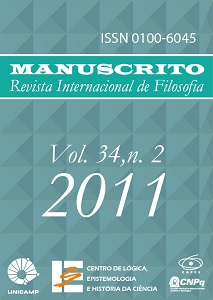Abstract
Since its introduction by Evans (1982), the generality constraint (GC) has been invoked by various philosophers for different purposes. Our purpose here is, first, to clarify what precisely the GC states by way of an interpretive framework, the GC Schema, and second, to demonstrate in terms of this framework some problems that arise if one invokes the GC (or systematicity) without clearly specifying an appropriate interpretation. By utilizing the GC Schema these sorts of problems can be avoided, and we thus propose it as a tool to facilitate argumentation that appeals to the GC.References
CAMP, E. “The Generality Constraint, Nonsense and Categorical Restrictions”. Philosophical Quarterly, 54, pp. 209-231, 2004.
CAMP, E. “Putting Thoughts to Work: Concepts, Systematicity, and Stimulus-Independence”. Philosophy and Phenomenological Research, 78(2), pp. 275-311, 2009.
CARRUTHERS, P. “On Being Simple Minded”. American Philosophical Quarterly, 41 (3), pp. 205-220, 2004.
CARRUTHERS, P. The Architecture of the Mind: Massive Modularity and the Flexibility of Thought. Oxford: Oxford University Press, 2006.
CARRUTHERS, P. “Invertebrate Concepts Confront the Generality Constraint (and Win)”. In R. Lurz (ed.) (2009), pp. 89-107.
CHOMSKY, N. Language and Mind. New York: Harcourt, Brace and World, 1968.
CLAPP, L. “Is Even Thought Compositional?”. Philosophical Studies, DOI: 10.1007/s11098-010-9649-2, forthcoming.
COHEN, J. and McLAUGHLIN, B. (eds.). Contemporary Debates in Philosophy of Mind. Oxford: Blackwells, 2007.
DUHAU, L. “Conceptuality and Generality: A Criticism of an Argument for Content Dualism”. Crítica, 41, pp. 39-63, 2009.
EVANS, G. The Varieties of Reference. Oxford: Oxford University Press, 1982.
FODOR, J. Psychosemantics: The Problem of Meaning in the Philosophy of Mind. Cambridge, MA: MIT Press, 1987.
FODOR, J. Concepts: Where Cognitive Science Went Wrong. Oxford: Oxford University Press, 1998.
FODOR, J. “Language, Thought and Compositionality”. Mind and Language, 16, pp. 1-15, 2001.
FODOR, J. LOT 2: The Language of Thought Revisited. Oxford: Oxford University Press, 2008.
FODOR, J. and LEPORE, E. The Compositionality Papers. Oxford: Oxford University Press, 2002.
FODOR, J. and PYLYSHYN, Z. “Connectionism and Cognitive Architecture: A Critical Analysis”. Cognition, 28, pp. 3-71, 1988.
HECK, R. “Are There Different Kinds of Content?”. In J. Cohen and B. McLaughlin (eds.), pp. 117-138, 2007.
JOHNSON, K. “On the Systematicity of Thought and Language”. The Journal of Philosophy, CI, pp. 111-139, 2004.
LURZ, R. (ed.), The Philosophy of Animal Minds. Cambridge, MA: Cambridge University Press, 2009.
PAGIN, P. “Compositionality in Context.” In G. Preyer and G. Peter (eds.) (2005), pp. 109-130.
PEACOCKE, C. A Study of Concepts. Cambridge, MA: MIT Press, 1992.
PREYER, G. and PETER, G. (eds.) Contextualism in Philosophy. Oxford: Oxford University Press, 2005.
ROBBINS, P. "The Myth of Reverse Compositionality". Philosophical Studies, 125(2), pp. 251-275, 2005.
RYLE. G. The Concept of Mind. Chicago: University of Chicago Press, 1949.
SEARLE, J. “The Background of Meaning.” In J, R. Searle, F. Kiefer, and M. Bierwisch, (eds.) (1980), pp. 221-232.
SEARLE, J., KIEFER, F., and BIERWISCH, M. (eds.). Speech Act Theory and Pragmatics. Dordrecht: Reidel, 1980.
SZABÓ, Z. “The Determination of Content”. Philosophical Studies, 148, pp. 253-272, 2010.
TRAVIS, C. “On Constraints of Generality”. Proceedings of the Aristotelian Society, 94, pp. 165-188, 1994.

